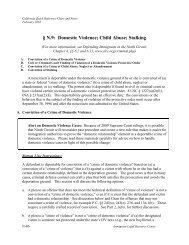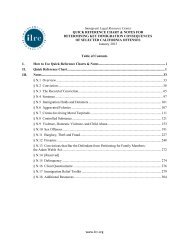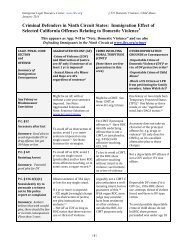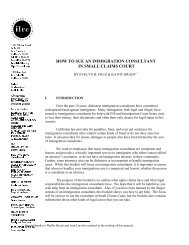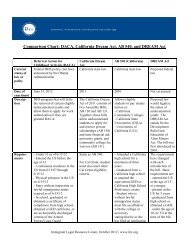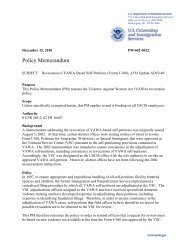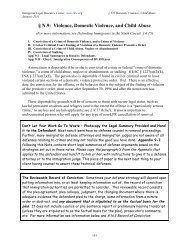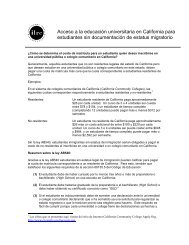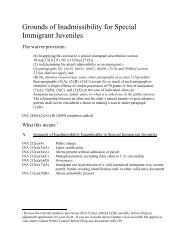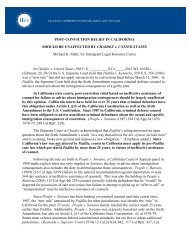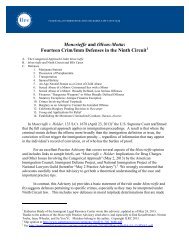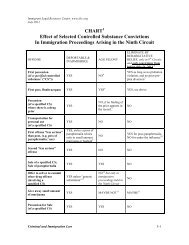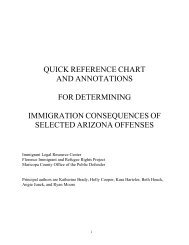quick reference chart and notes for determining immigration - ILRC
quick reference chart and notes for determining immigration - ILRC
quick reference chart and notes for determining immigration - ILRC
Create successful ePaper yourself
Turn your PDF publications into a flip-book with our unique Google optimized e-Paper software.
Cali<strong>for</strong>nia Quick Reference Chart <strong>and</strong> Notes<br />
February 2010<br />
Effect of Selected Drug Pleas under Lopez <strong>and</strong> Carachuri<br />
ENDNOTES<br />
1<br />
This <strong>chart</strong> was prepared by Katherine Brady of the Immigrant Legal Resource Center <strong>and</strong> updated in<br />
July 2010. For further in<strong>for</strong>mation <strong>and</strong> resources, go to www.ilrc.org/criminal.php.<br />
2 Lopez v. Gonzales, 127 S.Ct. 625 (2006) held that a single possession conviction is not an aggravated<br />
felony because it would not be punishable as a felony in federal court.<br />
3 Carachuri v. Holder, 130 S.Ct. 2577 (June 14, 2010).<br />
4 Where possible, have the record of conviction refer only to “a controlled substance” rather than a<br />
specific identified substance such as cocaine. Bargain <strong>for</strong> an amended complaint or make a written plea<br />
agreement to this effect; do not stipulate to a factual basis that identifies the substance. Without specific<br />
identification, <strong>immigration</strong> authorities may not be able to prove that the offense involved a controlled<br />
substance as defined under federal law, which has a somewhat different definition than under Cali<strong>for</strong>nia<br />
<strong>and</strong> many other state laws. See Ruiz-Vidal v. Gonzales 473 F.3d 1072 (9 th Cir. 2007) (because record of<br />
conviction under Calif. H&S §11377 does not ID specific substance, there is no controlled substance<br />
conviction <strong>for</strong> <strong>immigration</strong> purposes); Matter of Paulus, 11 I&N Dec. 274 (BIA 1965). Note that this<br />
defense does not apply to possession of paraphernalia. See footnote below.<br />
5 Lujan-Armendariz v. INS, 222 F.3d 728 (9 th Cir. 2000) (generally will eliminate offense); Estrada v.<br />
Holder, 560 F.3d 1039 (9th Cir. 2009) (will not if there was a probation violation); De Jesus Melendez v.<br />
Gonzales, 503 F.3d 1019, 1026-27 (9th Cir. 2007) (will not if prior pre-plea diversion).<br />
6 See Carachuri v. Holder, supra. See also Matter of Carachuri, 24 I&N Dec. 382 (BIA 2007).<br />
7 The Ninth Circuit found that Arizona possession of drug paraphernalia is a deportable controlled<br />
substance offense even without a specific controlled substance identified on the record. See Luu-Le v.<br />
INS, 224 F.3d 911 (9th Cir. 2000); Estrada v. Holder, 560 F.3d 1039 (9th Cir. 2009). The BIA held that<br />
it does not apply to presence in a place where drugs are used, either. Matter of Martinez-Espinoza, 25<br />
I&N Dec. 118 (BIA 2009)<br />
8 Cardenas-Uriarte v. INS, 227 F.3d 1132 (9 th Cir. 2000) (paraphernalia); Nunez-Reyes v. Holder, 602<br />
F.3d 1102 (9 th Cir. 2010) (under the influence, Calif. H&S § 11550(a)).<br />
9 Ariz. Rev. Stat. §13-1002, a “generic” solicitation offense not linked to a specific crime, is not a<br />
deportable drug offense. Coronado-Durazo v. INS, 123 F.3d 1322, 1326 (9 th Cir. 1997). In contrats, the<br />
Ninth Circuit found that “specific” solicitation to commit a drug offense such as under Calif. H&S §<br />
11352(a) is a deportable drug offense. Mielewczyk v. Holder, 575 F.3d 992, 998 (9th Cir. 2009)). The<br />
court opined that Calif. P.C. § 653f(d) is “generic solicitation” <strong>and</strong> there<strong>for</strong>e should not be treated as a<br />
deportable controlled substance offense. Ibid.<br />
10 United States v. Rivera-Sanchez, 247 F.3d 905 (9 th Cir. 2001)(en banc) (Cali<strong>for</strong>nia law); Leyva-Licea v.<br />
INS, 187 F.3d 1147 (9 th Cir. 1999) (Ariz. Rev. Stat. §13-1002).<br />
11 See 21 USC §841(b)(4), making this offense a misdemeanor <strong>and</strong> subject to the FFOA, which is the<br />
basis <strong>for</strong> Lujan; see discussion at Defending Immigrants in the Ninth Circuit, §3.6(C), supra. Counsel<br />
should arrange <strong>for</strong> a finding in the criminal record that the amount of marijuana was small.<br />
Immigrant Legal Resource Center N-85



